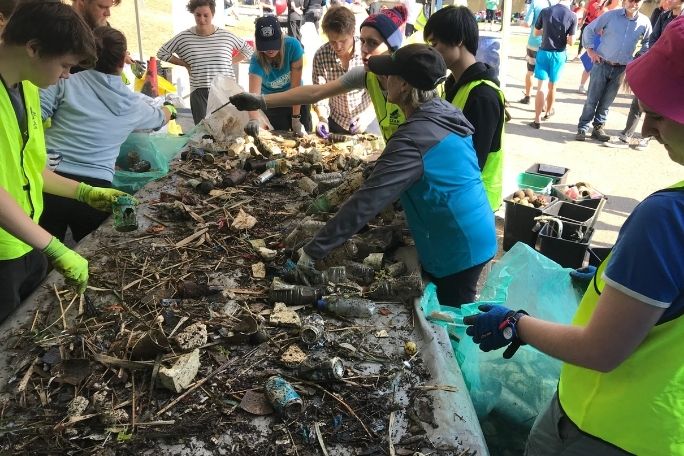Lesson summary
This lesson helps students begin to understand how waste affects our environment. Students begin this lesson by reviewing their current knowledge of waste and are introduced to the idea that waste can harm our environment. They then explore the concept of waste breakdown (decomposition) and participate in a simple experiment to study the different ways that waste materials decompose. The class will bury a variety of waste materials and dig them up at regular intervals to see how they are breaking down. This activity can be extended over several weeks or months, with the class revisiting the waste materials each week and recording their findings.
Learning intentions:
Students will...
- understand that waste can harm our environment
- understand what decomposition is
- recognise that some materials have slow decomposition rates
- understand why we should recycle.
Success criteria:
Students can...
- work collaboratively
- participate in class discussions
- follow instructions to conduct an experiment
- know some of the steps of the scientific process
- draw conclusions and make recommendations based on results.
Lesson guides and printables
Curriculum links
Select your curriculum from the options below.
Lesson details
Curriculum mapping
Australian curriculum content descriptions:
Foundation Science:
- Objects are made of materials that have observable properties (ACSSU003)
- Science involves observing, asking questions about, and describing changes in, objects and events (ACSHE013)
- Participate in guided investigations and make observations using the senses (ACSIS011)
- Engage in discussions about observations and represent ideas (ACSIS233)
- Share observations and ideas (ACSIS012)
Year 1 Science:
- Everyday materials can be physically changed in a variety of ways (ACSSU018)
- Pose and respond to questions, and make predictions about familiar objects and events (ACSIS024)
- Participate in guided investigations to explore and answer questions (ACSIS025)
- Use a range of methods to sort information, including drawings and provided tables and through discussion, compare observations with predictions (ACSIS027)
- Compare observations with those of others (ACSIS213)
- Represent and communicate observations and ideas in a variety of ways (ACSIS029)
Year 2 Science:
- Earth’s resources are used in a variety of ways (ACSSU032)
- Pose and respond to questions, and make predictions about familiar objects and events (ACSIS037)
- Participate in guided investigations to explore and answer questions (ACSIS038)
- Use a range of methods to sort information, including drawings and provided tables and through discussion, compare observations with predictions (ACSIS040)
- Compare observations with those of others (ACSIS041)
- Represent and communicate observations and ideas in a variety of ways (ACSIS042)
Year 3 Science:
- With guidance, identify questions in familiar contexts that can be investigated scientifically and make predictions based on prior knowledge (ACSIS053)
- With guidance, plan and conduct scientific investigations to find answers to questions, considering the safe use of appropriate materials and equipment (ACSIS054)
- Consider the elements of fair tests and use formal measurements and digital technologies as appropriate, to make and record observations accurately (ACSIS055)
- Use a range of methods including tables and simple column graphs to represent data and to identify patterns and trends (ACSIS057)
- Compare results with predictions, suggesting possible reasons for findings (ACSIS215)
- Represent and communicate observations, ideas and findings using formal and informal representations (ACSIS060)
Syllabus outcomes: STe-9ME, STe-4WS, ST1-12MW, ST1-4WS, ST1-9ES, ST2-4WS
General capabilities: Critical and Creative Thinking
Cross-curriculum priority: Sustainability OI.7, OI.9
Relevant parts of Foundation Science achievement standards: Students describe the properties and behaviour of familiar objects. They share and reflect on observations, and ask and respond to questions about familiar objects and events.
Relevant parts of Year 1 Science achievement standards: Students describe objects that they encounter in their everyday lives. They respond to questions, make predictions, and participate in guided investigations of everyday phenomena. They follow instructions to record and sort their observations and share them with others.
Relevant parts of Year 2 Science achievement standards: Students describe changes to objects, materials and living things. They identify that certain materials and resources have different uses. Students pose and respond to questions about their experiences and predict outcomes of investigations. They use informal measurements to make and compare observations. They record and represent observations and communicate ideas in a variety of ways.
Relevant parts of Year 3 Science achievement standards: Students use their experiences to identify questions and make predictions about scientific investigations. They follow procedures to collect and record observations and suggest possible reasons for their findings, based on patterns in their data. They use diagrams and other representations to communicate their ideas.
Unit of work: War On Waste – Foundation to Year 3
Time required: 60+ mins – the experiment can be extended over several weeks or months, with the class revisiting the buried waste materials each week and recording their findings
Level of teacher scaffolding: High – lead students in discussion, experiment preparation and observations
Resources required
- Device capable of displaying images
- Litter Image
- Student Worksheets – one copy per student
- Waste Safety Code (optional)
Skills
This lesson is designed to build students’ competencies in the following skills:
- Critical thinking
- Communication
- Collaboration
Additional info
Cool Australia’s War On Waste lessons have been developed in partnership with Lune Media and with support from the Australian Environmental Grantmakers Network. These lessons have been designed to lead students through a deeper understanding of some of the big issues relating to waste in Australia and to support them to take action to reduce the impact of waste on our environment.


Welcome back!
Don't have an account yet?
Log in with:
Create your free Cool.org account.
Many of our resources are free, with an option to upgrade to Cool+ for premium content.
Already have an account?
Sign up with:
By signing up you accept Cool.org's Terms and Conditions(Opens in new tab) and Privacy Policy(Opens in new tab).